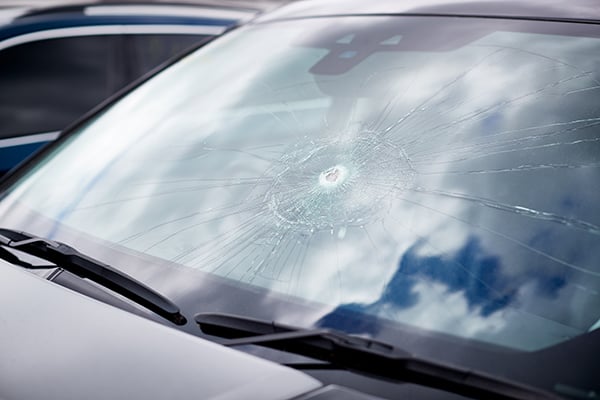Have you ever wondered what “comprehensive insurance” actually is and just how comprehensive it can possibly be? That’s not uncommon, especially when many people would assume that the word "comprehensive" implies that this type of auto insurance could cover absolutely everything.
That isn’t the case, but by the time you read this, you’ll have a much better answer to the question of “what is comprehensive insurance?” If you’ve been considering adding it to your insurance policy or alternatively dropping it, in this article you can find out everything you need to know to make the best decision for yourself and your family.

Understanding the Role of Comprehensive Auto Insurance
Comprehensive car insurance is an optional form of auto insurance which covers a number of situations where your vehicle is damaged in a manner other than a collision. These things might not be as common as car accidents, but they can have an aftermath that is difficult to handle without proper insurance. It also covers situations like fires, vandalism, rockslides, and more.
This sort of car insurance is beneficial and offers a number of valuable protections, but it does not cover rentals, towing, or personal property. Even though it may not cover everything, this doesn’t make it any less useful for many drivers across the United States. Comprehensive insurance can help you repair or replace your car after something other than a collision happens to damage it without dipping into your pocket more than necessary.
What is Covered by Comprehensive Auto Insurance?
Comprehensive insurance will cover damage to your car due to acts of nature and other damage that is unrelated to auto accidents. You should always discuss the terms with your insurance company to get all the details because each company will have its own set of coverage options. However, the following items are typically covered by comprehensive coverage:
Damage caused by animals, such as when you hit a deer
Damage to your car glass
Falling objects
Fire
Flooding
Natural disasters such as tornadoes or hurricanes
Vandalism

How Comprehensive Insurance Works
Another part of the question of“what is comprehensive auto insurance” pertains to how it actually works. One of the things you may not know is that if you choose to lease or otherwise finance a vehicle, comprehensive coverage is typically required by your bank or finance company. This is a form of protection for them since the vehicle is still under their ownership.
If financing a vehicle is what you want to do, the bank isn’t going to agree to that unless there is proof that you have comprehensive and collision coverage, as well as all the minimums required by your state. Some states will only require you to have both property damage coverage and bodily injury coverage. Others will also want proof that you have underinsured and uninsured motorist coverage, especially in no-fault states. So, in order to finance your car, your lender will need to see proof that you are covered appropriately to limit their own risks.
The way comprehensive coverage works is by assisting if your car becomes damaged by something other than an accident. For instance, if you have your car outside when it hails and it damages your car, you can file an insurance claim with your insurance provider. This can often be done by calling, filing online, or using a mobile app. After the adjuster confirms coverage on the day the damage occurred, you can have the car repaired. You are responsible for paying the deductible while the insurer pays for the rest of the cost to repair your vehicle up to the limit on your policy, which is usually the actual cash value of your vehicle.
Who Needs Comprehensive Auto Insurance Coverage?
There are many people who can benefit from speaking with an auto insurance company, and plenty of them are looking up “what is comprehensive auto insurance” right now. As mentioned, if you purchase a new car or if you lease a car, you either have to get comprehensive insurance or choose to pay for the car all at once. Since that isn’t an option for most people, comparing insurance quotes can give you an idea of which company to go with.
As an idea of how often people choose comprehensive insurance, the Insurance Information Institute shows 77% of insured drivers choose it in addition to liability insurance. It is usually pretty inexpensive. The most commonly selected deductible by vehicle owners who choose comprehensive insurance is $500, but you can go with a lower or higher deductible based on your budget and needs.
Even those who are not financing a car can find that comprehensive auto insurance is worth the small monetary investment. Considering it can offer protection in all sorts of situations that aren’t covered in any other way, it’s well worth it if you have a vehicle that you want to keep in great shape without having to dip very far into your pockets.
It’s also an excellent idea to consider the value of your car and how old it is. If you have a vehicle that is paid off, it’s optional to have comprehensive coverage. Knowing what the value of your car is will give you an idea of whether this is the right insurance choice for you. If you can afford to purchase a new vehicle in the event of an incident that results in totaling your vehicle, comprehensive coverage may not be needed. If your vehicle has a low cash value, you'll want to consider whether it's worth it to you or not to pay the premiums for coverage and not get much back in return if the vehicle is totaled.
Comprehensive Coverage Deductibles and Limits
At the time when you choose to buy comprehensive auto insurance, you are going to choose a set deductible, which is the amount that you are going to pay yourself in the event of a covered claim. As an example, if you pick a $750 deductible, and then you file a claim for vandalism which requires a $2,000 cost of repairs, you’d pay $750 while the other $1,250 would be handled by your insurance company. If you have a higher deductible, you pay more out of pocket when you need to use your coverage.
You also need to keep in mind that there is a limit with comprehensive coverage. That means that your insurance company will have a cap on how much money they will pay toward a claim. In most cases, the limit on coverages for theft, vandalism, or other issues is the cash value of your vehicle. It is essential to fully understand the insurance policy that you choose for your vehicle, so be sure to read your policy documents carefully and contact your insurance company if you have questions -- preferably before you need to use the coverage so there are no surprises.
As an example of how comprehensive coverage works, if your car is stolen, the comprehensive coverage will pay you back the actual cash value of the vehicle. Insurance companies usually require you to file a stolen vehicle report and wait a certain number of days to make sure that the vehicle cannot be recovered before they pay out. After you receive your claim settlement, you are free to put that money towards a new vehicle of your choice, or spend it in whatever way you wish if you don't need to replace your stolen vehicle.

The Legal Lowdown
It’s worth being aware that no state requires you to purchase comprehensive coverage in order to register a vehicle. As we have mentioned earlier, most lenders are going to make it mandatory that you have this sort of coverage in order to purchase a car through financing. Since the company or bank who is leasing or financing the vehicle still officially owns the car, it’s important to them that their property is protected, and that they will be paid should something happen to it.
Make sure to inquire about the types and limits of coverage that your lender will require before you fall in love with a car. It's also a good idea to get insurance quotes on that type of vehicle so you know how much you can expect to be paying for insurance.
What Comprehensive Coverage Doesn’t Cover
While comprehensive insurance covers a wide variety of things, it doesn’t cover everything. Other insurance options like collision insurance and liability insurance are still needed to handle situations where your car is involved in an accident. The following are a few of the other things that are not going to be covered by a comprehensive claim:
Medical expenses for you or your passengers following an auto accident
Damage done to another person’s car during a collision
Damage to your own car resulting from an automobile accident
Questions to Consider Before Getting Comprehensive Auto Insurance
At this point, you know almost everything you need to know in order to decide whether comprehensive auto insurance is necessary in your situation. However, we have a few questions that you should ask yourself before making that final decision. Think these things through and you will likely have your answer or be that much closer to making your final choice.
Do You Want to Pay Less for Insurance or Have Coverage for Repairs?
As we mentioned earlier in this article, comprehensive auto insurance is a small amount of your entire insurance payment every month or quarter. If you decide not to go with comprehensive insurance, that means you have a few extra dollars each month to spend on other things. That might sound like the obvious choice, but keep in mind that if something happens to damage your car, you are then in a situation where you need to pay for the damages out of your bank account.
Can You Afford to Buy a New Car?
If something goes very wrong, such as hail coming down and smashing your car to the point where it is totaled, that can be a serious emergency situation. Consider how likely it would be for you to be capable of paying out of pocket to replace that vehicle. If the answer to this question is no, it’s probably best to choose to pay for comprehensive insurance so you know you can get your car repaired or replaced if a crazy situation occurs.
How Likely Are You to Have a Claim?
While everyone hopes that nothing bad happens to their vehicle, you also can never really know what might happen at random that could lead to damage your car or, worse yet, totaling the vehicle. If disaster strikes, comprehensive coverage can help you out of a seriously sticky situation by paying to repair or replace your vehicle.
If you skip the comprehensive coverage, all of that money for repairs is going to come out of your pocket. Keep in mind that these costs can vary depending on how much your car is valued at and what damage was done.
That’s the lowdown on comprehensive coverage, which can be extremely helpful if your car gets damaged or destroyed from something other than an auto accident. Many people will need this kind of insurance in order to finance their next car, while others will choose to get it to save on repair bills if something other than a collision damages the vehicle.
Being aware of your options will ensure you make the best possible decision about whether or not to purchase comprehensive auto insurance coverage. Take a look at cheap car insurance quotes online and choose the auto insurance quote that best fits your needs!

